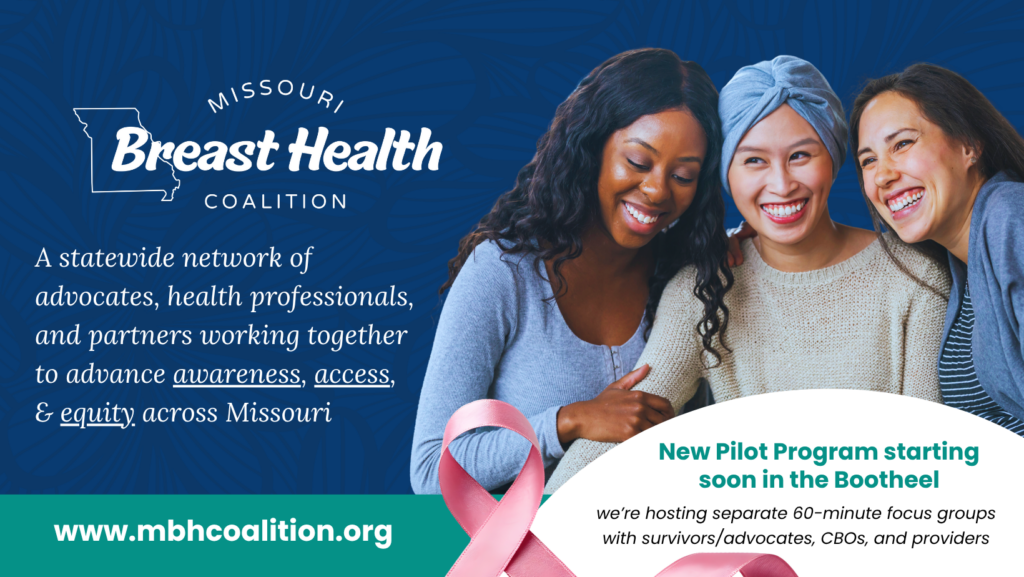
Welcome to our digital newsletter! Your source for updates on health equity initiatives, community partnerships, and IHN programs, it’s your go-to source for collaboration, innovation, and impact in the St. Louis region & beyond. Let’s build healthier communities together.

CITY OF ST. LOUIS LAUNCHES 2025 CITY FOOD INSECURITY FUND TO SUPPORT RESIDENTS FACING HUNGER

Mayor Cara Spencer recently announced the launch of the 2025 City Food Insecurity Fund, a new community-driven initiative focused on improving food access and supporting St. Louis residents experiencing hunger. The effort comes at a critical time as many households continue to navigate rising food costs and disruptions in essential support programs.
This initiative brings together a strong network of local partners, including the City of St. Louis, St. Louis Area Foodbank, Operation Food Search, United Way of Greater St. Louis, the Empowered Thriving Communities cooperative, and the St. Louis Integrated Health Network (IHN). By working collectively, these organizations aim to help ensure that every neighbor has consistent access to healthy and affordable food.
IHN is honored to join these partners in supporting a healthier, more nourished St. Louis community.
Read the full announcement: https://bit.ly/4nSMPim
Donate directly here: http://helpingpeople.org/cityfoodfund
SUPPORTING FAMILIES THROUGH THE SNAP INTERRUPTION

Andwele Jolly, IHN President & CEO interviewed by local St. Louis News: FOX 2 covering a story on “Dozens line up as CareSTL serves hot meals to families impacted by SNAP pause.”
Earlier this month, the St. Louis Integrated Health Network (IHN) joined partners across the region to support families navigating the recent interruption in SNAP benefits. Through two community events hosted at health centers in St. Louis City and County, we worked together to distribute 1,000 hot meals and 900 cans of infant formula to families experiencing immediate needs.
These events were made possible by the commitment of our partner health centers. We extend our sincere thanks to Affinia Healthcare, Betty Jean Kerr People’s Health Center, CareSTL Health, Family Care Health Centers, and the St. Louis County Department of Public Health for serving as essential partners in our network, hosting meal sites, and bringing neighbors together during a challenging moment.
We are also grateful for the partnership of local food trucks, the St. Louis Area Foodbank, and the Empowered Thriving Communities (ETC) cooperative. Their continued dedication strengthens our shared mission to serve the community and support families during times of need.
Community collaboration is at the heart of this work. To help us continue hosting events like these, text STLIHN to 53-555 or visit https://givebutter.com/STLIHN.

Above: Andwele Jolly, IHN President & CEO interviewed by local news station KMOV St. Louis News: covering a story on “500 hot meals given out to help SNAP recipients.”
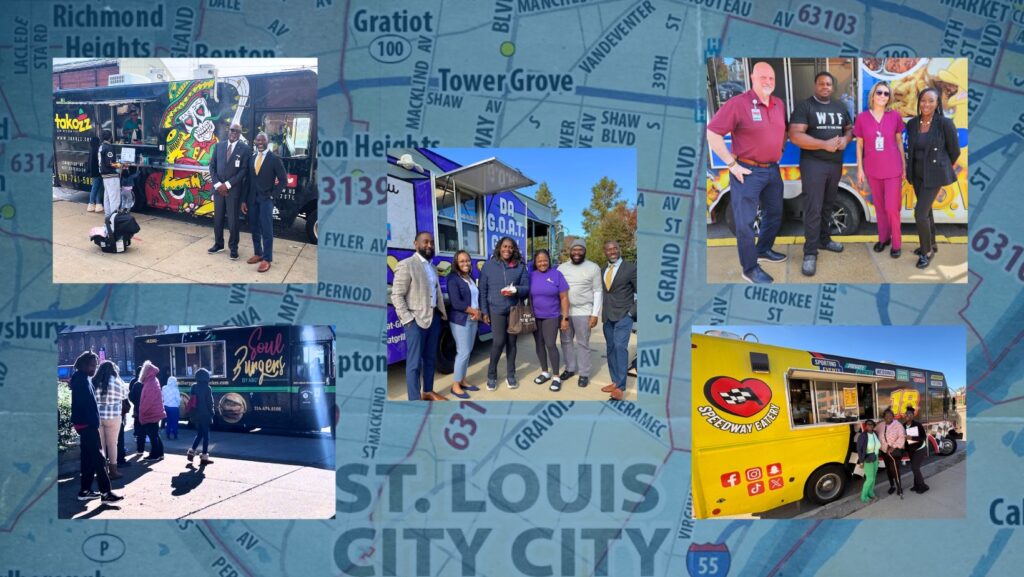

STAFF SPOTLIGHT: ERIN MURPHY

This month, the St. Louis Integrated Health Network is proud to recognize Erin Murphy, Director of Grants & Contracts, for her exceptional leadership, collaboration, and dedication to strengthening our mission. Erin’s work touches nearly every corner of the IHN, and her colleagues consistently describe her as someone who brings clarity, stability, and kindness to every project she touches.
Doretha Dillon, Assistant Director of Clinical and Community Integration, Care Transitions Initiative at the IHN shared:
“I have had the pleasure of working with Erin for the past couple of years. She has always been such a warm, welcoming person. Erin’s calm nature allows peace in chaotic spaces. She maybe a woman of short stature but her integrity is gigantic. I appreciate her honesty and encouragement. She is an activist at heart for the well-being and equity of all people. I am so honored to know such a pure hearted human.”
Emily LaCour, Assistant Director of Clinical and Community Integration, Care Transitions Initiative at the IHN echoed this, adding:
“I am so grateful to have had the opportunity to work closely with Erin since I started with IHN in 2019. I admire how she has adapted and grown through her various roles at IHN. Through it all she has remained a fierce advocate for equity. She also has a huge heart and is someone I can always count on to talk through hard things personally or professionally.”
From guiding our Community Referral Coordinators, to ensuring that our grant-funded initiatives are positioned for success, Erin continues to elevate the IHN’s work with her steady leadership and commitment to excellence.
We’re grateful for everything she brings to our organization — congratulations, Erin, and thank you for all that you do!
WHEN DISASTER STRIKES, TBED INITIATIVES ARE FOCUSING
ON ECONOMIC AND SOCIAL IMPACTS
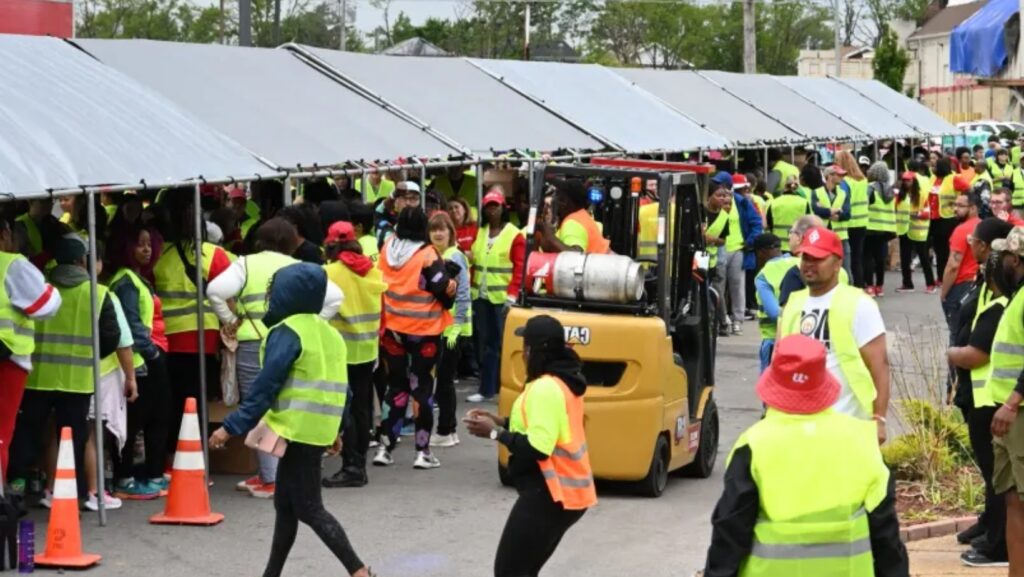
Across the country, technology-based economic development (TBED) organizations are stepping beyond their traditional roles to support communities in times of crisis. While disaster relief is not typically part of their core mission, recent events have shown how deeply emergencies can disrupt the people, organizations, and neighborhoods connected to their ecosystems.
An article by SSTI highlights how TBED organizations in Missouri, North Carolina, and South Carolina mobilized their networks and expertise to respond to natural disasters and pressing public health challenges. In Missouri, the story features the powerful collaboration between BioSTL and the St. Louis Integrated Health Network (IHN) following the May 2025 St. Louis tornado. When impacted residents urgently needed ways to keep essential medicines cold during widespread power outages, IHN identified the need, and BioSTL quickly activated its innovation network—connecting with MilliporeSigma to secure pallets of scientific-grade coolers within hours. This rapid, partnership-driven response helped neighbors maintain access to life-sustaining treatments during a critical moment.
To learn more about how TBED organizations stepped up across multiple states, read the full article here.
STRENGTHENING ST. LOUIS: HOW DR. PUNCH AND 314 OASIS ARE MEETING THE MOMENT
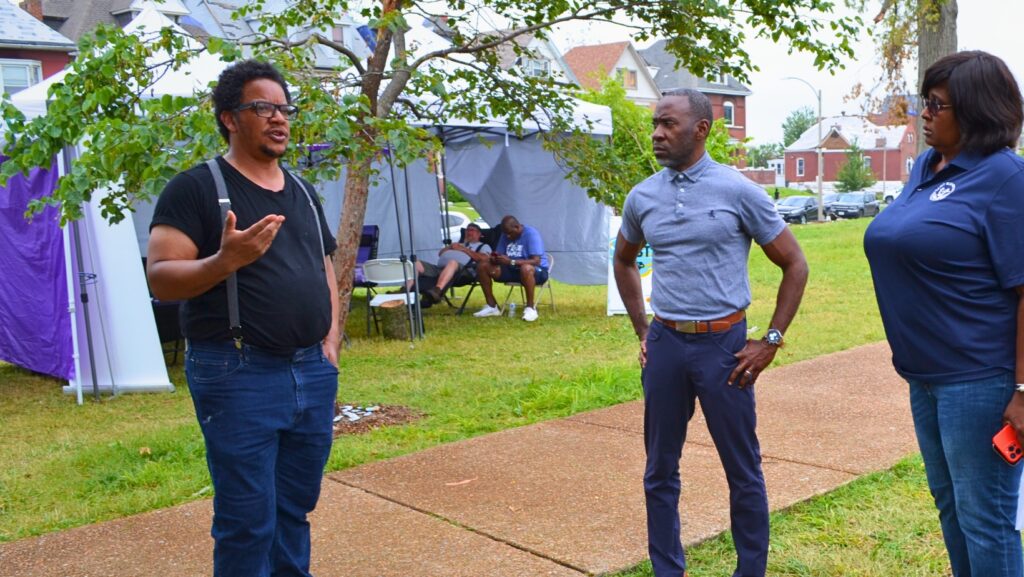
Local Food Trucks delivered over 100 meals at the Affinia Healthcare, CareSTL Health, Family Care Health Centers, BJK People’s Health Centers, and St. Louis County Health Center | Pictured from left: Dr.Punch, Andwele Jolly, IHN President & CEO, and Regina Marsh, Chief Executive Officer, St. Elizabeth’s Adult Day Care Center
We’re delighted to shine a spotlight on Dr. Punch, a phenomenal partner of the St. Louis Integrated Health Network (IHN). His leadership at 314 Oasis—centered on trauma-informed healing, community outreach, and hands-on support for residents across St. Louis—continues to make a profound impact. From advancing trauma and healing work to stepping up in the wake of the recent tornado, Dr. Punch’s dedication to community recovery and resilience is both inspiring and essential.
In support of this mission, IHN has proudly contributed funds to 314 Oasis to help them purchase a mobile vehicle that will expand their food and outreach efforts across North St. Louis. Please join us in congratulating Dr. Punch and the entire 314 Oasis team for their unwavering commitment to helping St. Louis recover, rebuild, and thrive. Read more about Dr. Punch and the work of 314 Oasis in a recent article published in the St. Louis Post-Dispatch here.
IHN PRACTICUM STUDENT RECEIVES WASHU
CORA FAITH FELLOWSHIP AWARD
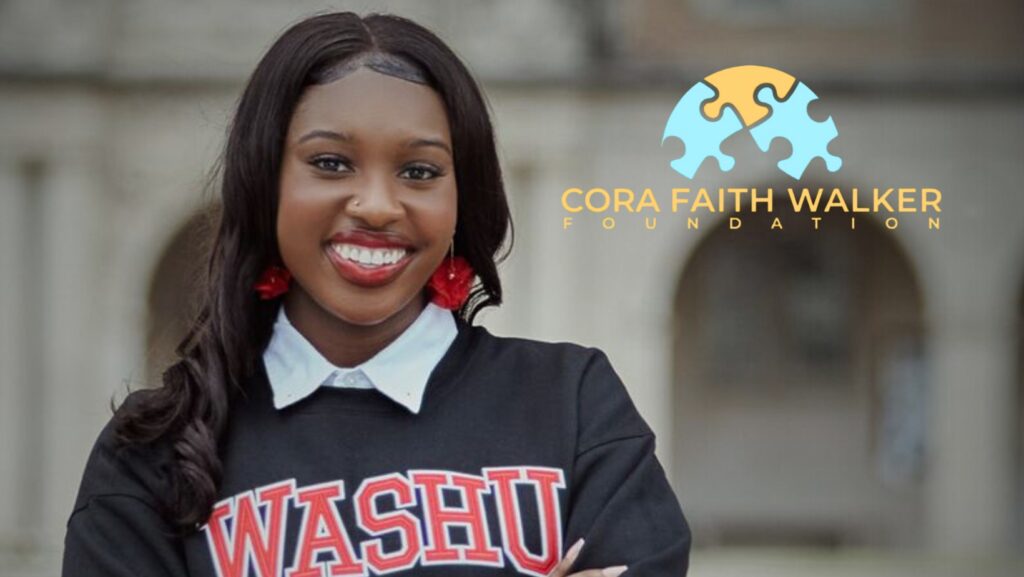
We are proud to celebrate IHN practicum student Hailey Jones, who has been awarded the 2025 Cora Faith Walker Foundation Scholarship from Washington University in St. Louis. This prestigious honor recognizes Hailey’s outstanding commitment to health equity and health policy, values that reflect the legacy of Cora Faith Walker and her dedication to advancing community well-being.
Through this scholarship, Hailey will receive $1,000 to support her practicum work with a focus on improving health outcomes and promoting equity across our region. The fund was established to assist Brown School students who are pursuing meaningful, equity-centered careers—and Hailey’s passion and professionalism exemplify that mission.
We are honored to have Hailey as part of the IHN team and thrilled to support her as she continues developing her academic and professional journey.
Hailey shares her reflections on receiving this award below:
“I’ll try calling people earlier in the day tomorrow,” I vociferated over my slumped shoulder. In the haze of a summer afternoon’s dusk, I was speeding ahead of my mother and sister who had eagerly invited themselves on my impromptu evening walk. They were curious about the start of my internship with the St. Louis Integrated Health Network (IHN). For the past two hours, I had been calling individuals who were affected by the May 16th tornado in St. Louis, MO, providing them with useful resources. Half of my time that day was spent listening to an imaginative lady who was easily distracted and really only needed someone to listen to her life’s story and its hardships. Truthfully, conversation was exhausting. The previous day, I made fifteen calls – nearly all went to voicemail. So, on this day, I called people after usual business hours, hoping to catch them after work. Almost everyone answered after the first ring; those who did not, returned my call while I was on the phone with the next person on my list. On my way out for my walk, I left the phone ringing on my desk.
My work with the IHN’s Community Referral Coordination tornado relief referral calls began nearly two months after the tornado, offering me both retrospective and prospective views of the relief efforts. After contacting many more folks, I now know to expect one of two greetings: either one of harshness or a sigh of relief. Some individuals defensively answered calls from unknown numbers to stave off scam callers or simply do not pick up the phone. Others, recognizing that they were in tremendous need but unsure of how exactly they needed assistance, welcomed any help with wide arms. The individuals I contacted were simultaneously inundated by the threat of being taken advantage of during an especially vulnerable point in their lives but also by the multitude of resources at their disposal. I have observed how this inundation stagnates the process of disaster relief efforts. Many affected individuals were weary of scams and hesitant to receive help, or they did not know where to begin and responded by doing little to seek assistance. Because of these common scenarios, I have frequently spoken with individuals a few days – or sometimes just one day – after the discontinuation of certain resources that would have been particularly useful to them.
The start of my calls – six weeks after the tornado – collided with what should have been a turning point in relief efforts from short-term aid to long-term support for deeply affected individuals. The relief efforts provided by area businesses and organizations formed an unsustainable patchwork of assistance that has left the most in-need individuals with few places and resources to return. While making referral calls, I remember learning, after making nearly
100 calls, that some of the resources I had been offering during each call were discontinued weeks prior to the start of my phone calls. It was only after one individual called me back to explain that I had provided her with multiple resources that were duds that I began contacting organizations myself to ensure they were still active. To my dismay, no one that I had spoken with prior to this lady ever informed me that they were provided with useless resources. From this, I recognized that those I contacted needed much more than to be handed a list of resources. As the person reaching out, I had to take the responsibility to advocate for affected individuals by double checking that the resources I provide are active. Doing so guaranteed that my work in providing resources led to less, not more, work for those I was assisting.
Under the direction of IHN, I have written a policy brief that will be used by the organization to advocate for policy that encourages better preparedness for disaster response. It will also be used in program planning and development of outreach programs for those impacted by the tornado. In the policy brief, I recommend that the City of St. Louis implement routine audits to maintain preparation against future weather disasters. I also suggest that the city invest in an emergency rainy day fund to ensure immediate response after future disasters and that the city work together with area businesses and organizations to create cohesion between aid efforts. I was encouraged to call attention to systems that disproportionately disadvantaged low-income and African American individuals in St. Louis. I was pushed to further reimagine how St. Louis city government could grow from the tragedy caused by the tornado.
One day before the tornado, I left St. Louis to live at home for the summer. When I learned of the tornado, I was oblivious to its detriment on the lives of so many St. Louisans. At times, at the end of a call, an individual would express how touching it is to have someone reach out to them, offer assistance, and listen to their needs. These interactions energized me. Even though the first couple of days of calls was exhausting for me, it was also humbling to know that while I was in the comfort of my home with my family, there were individuals – with whom I may have unknowingly crossed paths – who were experiencing the shock and stress of watching their homes and livelihoods wiped away by the tornado. I quickly realized that the least I could do was listen and help as best I could.
The scholarship I received from the Cora Faith Walker Foundation afforded me the opportunity to work with IHN. I am deeply grateful for this experience, as I have grown to be
more compassionate and attentive to the needs of others. With each call, it amazed me just how impactful it is for an affected individual to be seen and understood. I look forward to a time when the tornado and its aftermath are a distant memory. I am also hopeful that responses to future disasters will take from that of this tornado, so that those affected may have their needs met in meaningful, cohesive, and sustainable ways.
CONFERENCE RECAP: SCIENCE FOR HEALTH SYSTEMS (S4HS)
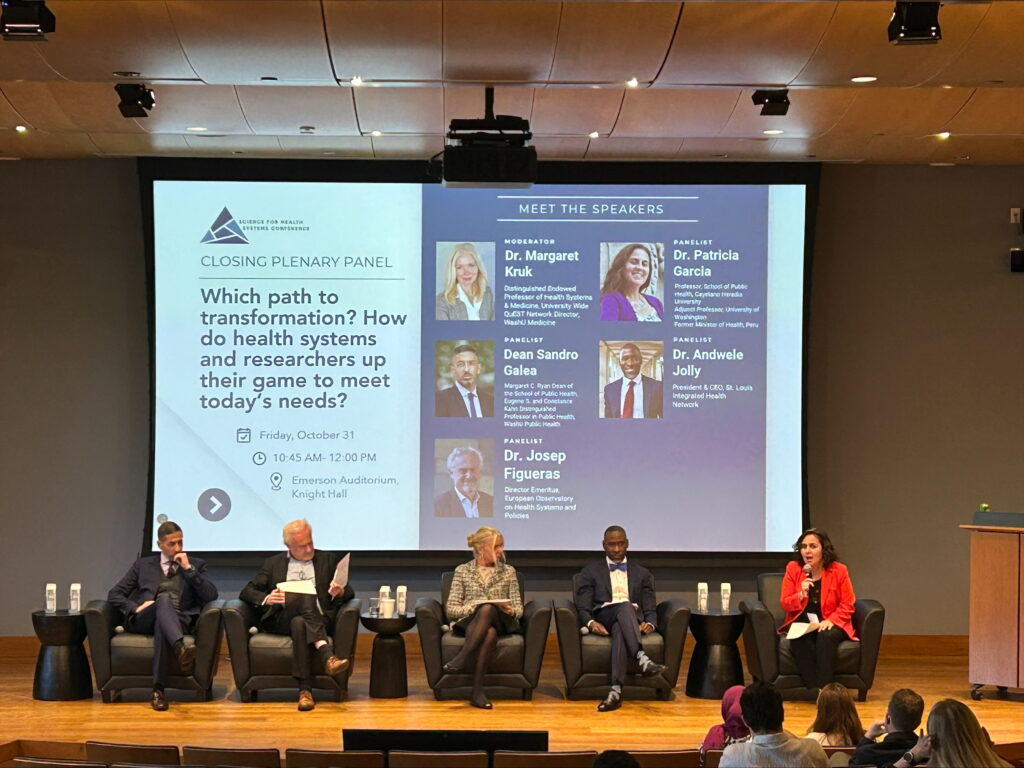
Pictured from left: Sandro Galea, MD, DrPH Margaret C. Ryan Dean of the School of Public Health, WashU, Josep Figueras, MD, MPH, PhD (Econ), FFPH, Director Emeritus of the European Observatory on Health Systems, Margaret Kruk, MD, MPH Distinguished Endowed Professor of Health Systems & Medicine, Andwele Jolly, DPT, MBA, MHA President and CEO, St. Louis IHN, and Patricia J. García, MD, MPH, PhD Affiliate Professor, Global Health. Dean of the School of Public Health
The Science for Health Systems (S4HS) Conference, co-hosted by the QuEST Network and Washington University School of Public Health, took place on October 29th–31st and convened researchers, policymakers, and implementers from across disciplines and regions to share cutting-edge work on measuring and improving health system performance with a focus on comparative, large-scale studies and research on health system reform, redesign, and improvement, the conference offers a unique space to advance global conversations on quality.
IHN’s Chief Program & Policy Officer Ryan Barker attended and reflected:
“Policy is a key component to improving how any country’s health system operates and researchers must engage in this arena. It was an honor to participate in the panel, ‘How to have policy impact: what works, what fails, and how to do better,’ and to share my thoughts and experiences of working in health policy over the last 20 years. One of the major takeaways that I offered was for researchers to engage community prior to launching any research and the importance of seeking input and feedback from those who are the most impacted by the failures of health systems.”
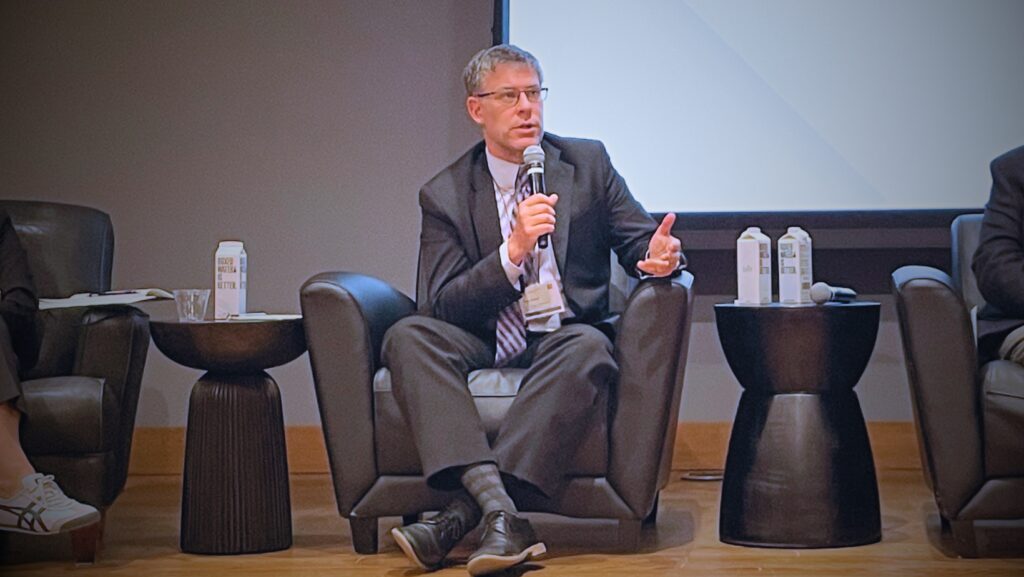
As part of another panel at S4HS, Ryan Barker, Chief Program & Policy Officer, spoke on engaging with policymakers and the importance of knowing your audience when discussing health research.
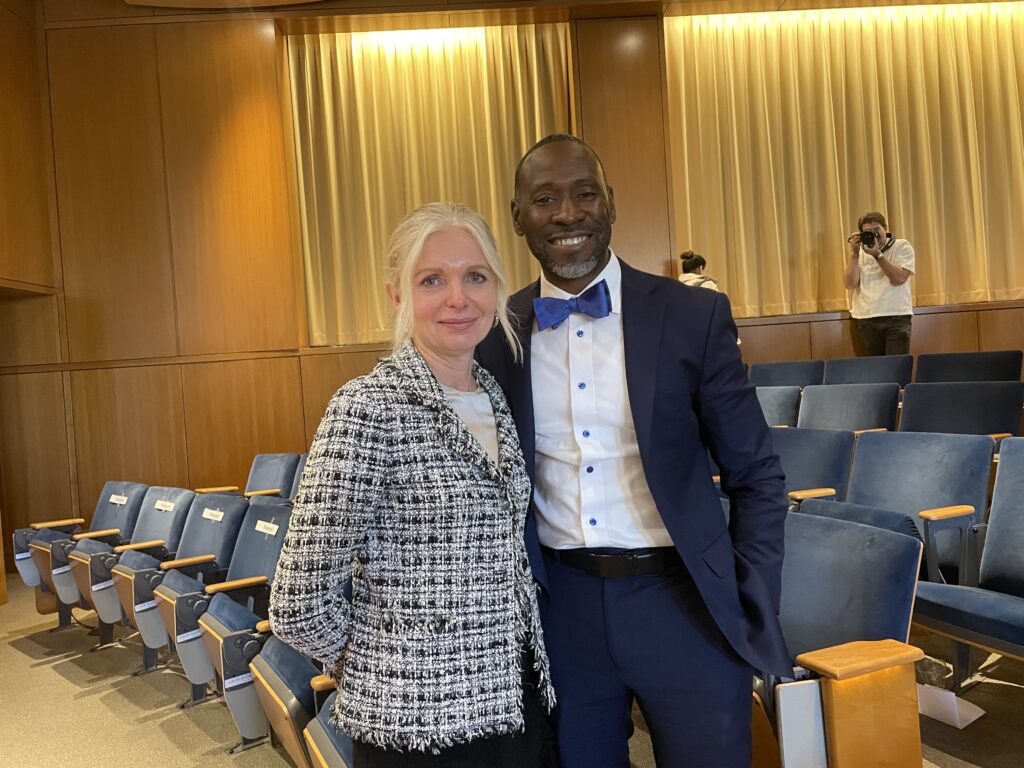
Pictured above: Margaret Kruk, MD, MPH Distinguished Endowed Professor of Health Systems & Medicine, University Wide QuEST Center Director and Andwele Jolly, DPT, MBA, MHA President and CEO, St. Louis Integrated Health Network

Highlighting the real-life impact of the IHN. From the experiences of our dedicated staff to testimonies from the community we serve, these stories showcase the importance of access, collaboration, and compassionate care in our community.
MEETING FAMILIES WHERE THEY ARE
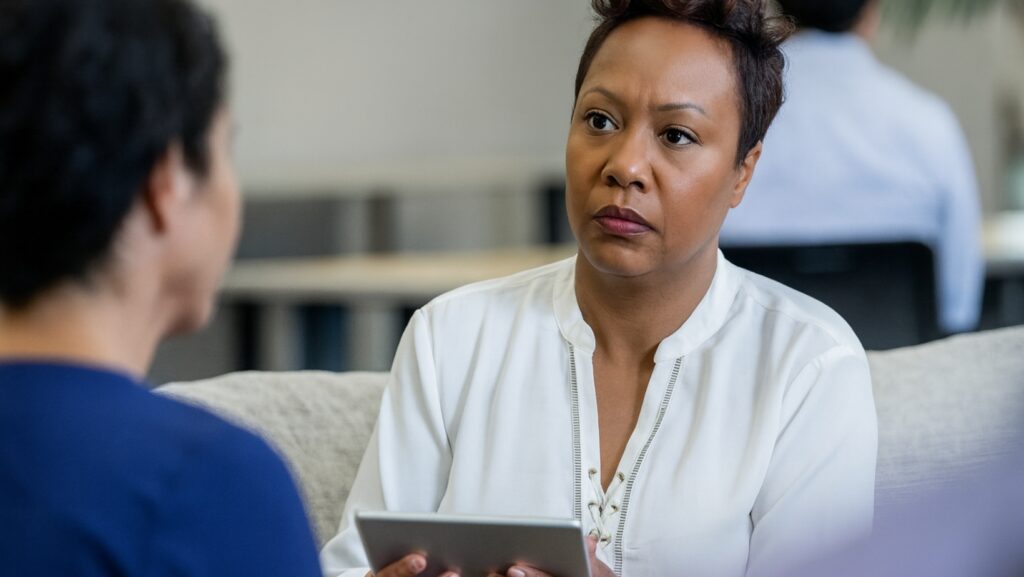
This month, we’re highlighting the meaningful, person-centered work of our Community Referral Coordinators—team members who meet patients in moments of vulnerability and walk alongside them toward stability, support, and care.
This month’s story comes from one of our CRCs, who shared the following experience:
“A patient reached out needing help getting a behavioral health appointment, but upon speaking with the mother, I realized there were more pressing needs. Over several phone calls, I listened as she explained her situation and tried to identify resources that could support her. The mother is disabled and homeless and has been unable to work. I helped her apply for Beyond Housing, an organization that assists with affordable housing and employment/vocational support. I also scheduled her two children at the North Central Health Center.
She was very appreciative, as she is facing many challenges. I think having someone who could take the time to listen was helpful for her as well. I truly hope the housing resources will provide the stability she needs.”
Stories like this reflect the heart of our mission: meeting families where they are, listening with compassion, and connecting them to the resources that can make a meaningful difference in their lives.

Highlighting the power of partnership. From community-based organizations to healthcare institutions, IHN is proud to collaborate across sectors to advance health equity in the St. Louis region and beyond.
EMPOWERED THRIVING COMMUNITIES
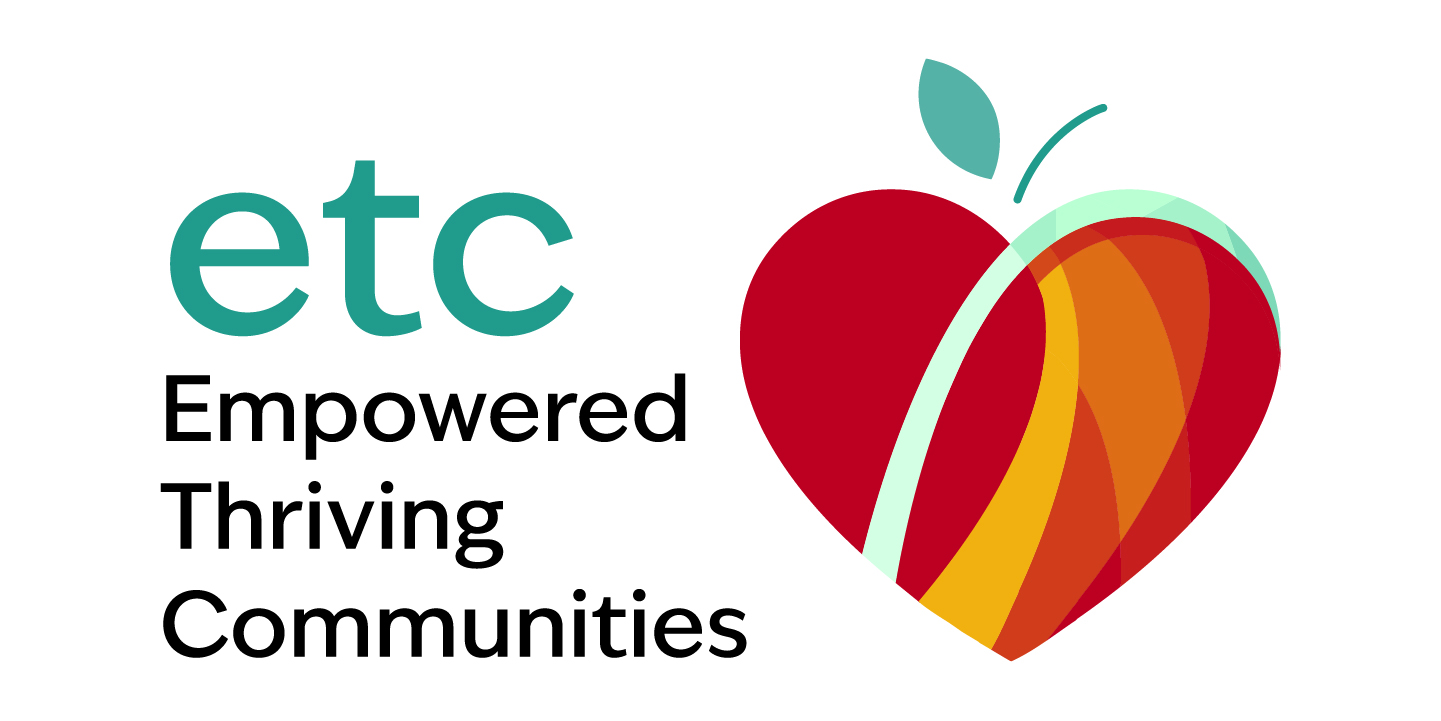
Empowered Thriving Communities (ETC), is a community – driven collaborative that is who is committed to transforming systems and empower thriving communities to have joyful and abundant access to food and health. The collaborative encompasses 35 members who are activated within the sectors of food and nutrition, community design, health and wellness, and advocacy and policy.
Over the last few weeks, ETC mobilized to mitigate the expected food and health implications of the Supplemental Nutrition Assistance Program (SNAP) cut due to the government shut down. On October 29th, IHN and ETC held a convening call with 150 leading organizations across the St. Louis Region to highlight the benefit cut, discuss preparation and current efforts, and build strategy and internal resource.
ETC has proven that a collaborative with such infrastructure is essential to support communities with current and emergent food, nutrition, and wellbeing needs. Investing in hyper-local grassroots organizations ensures direct community engagement, nurturing localized power, and creating creative, congruent, and holistic solutions to advance justice and equity.
To learn more about Empowered Thriving Communities, please visit https://etc-stl.org/.

The IHN policy team has been closely following both federal and state movements that impact our work.
At the federal level, all the focus has been on the record-long federal government shutdown. The shutdown cut off Supplemental Nutrition Assistance Program (SNAP) benefits for millions of Americans, forced federal workers to go without pay (some of whom were still required to work), and was starting to disrupt air travel, among other impacts. Fortunately, the shutdown ended on November 12 when President Trump signed a continuing resolution that funds the government through January 30, 2026. While all government functions are funded through January 30, the legislation including appropriations to fund SNAP through all of the current fiscal year (until September 30, 2026). Congressional Democrats had been focused on funding to extend the enhanced premium tax subsidies for Affordable Care Act Marketplace coverage, and there is an expectation that separate legislation will be considered in December to mitigate massive premium increases for Marketplace plans. We will continue to monitor this situation as it may significantly increase the number of uninsured individuals- with one woman from Missouri interviewed on NPR recently that would face increased costs of $1,000 per month for her coverage if the credits are not extended.
We have also closely been monitoring Missouri’s public updates regarding their application to the Center for Medicare & Medicaid Services (CMS) for the Rural Health Transformation Program (RHTP). The RHTP was created as part of H.R. 1 legislation earlier this year to offset anticipated losses in funding for state Medicaid programs that would create major financial challenges for rural healthcare providers. Missouri is expected to get $500 million, plus additional competitive funds, to support this work, with CMS indicating that funding decisions will be made by the end of CY 2025. While IHN does limited work in rural areas currently, we anticipate that the application will introduce significant transformation in Missouri’s Medicaid program and are therefore looking for opportunities to align with these efforts. Missouri launched a public website that we expect will continue to share new information regarding the program as information becomes available.
Also at the state level, we are tracking Missouri Governor Mike Kehoe’s efforts to follow through on his campaign promise to eliminate the state income tax. Currently, Missouri is projected to have a $1 billion budget shortfall in FY 2027 due in part to the end of COVID-related funding to the state. The elimination of the state income tax would be layered on top of that financial situation, and Missouri receives more than half of its general revenue from the state income tax. The loss of this funding would result in funding shortfalls for a range of programs that are yet to be identified.
A SEASON FOR CONNECTION, JOY, AND REFLECTION

As we move through this time of year, many of us find space to pause, reconnect, and surround ourselves with the people who bring meaning to our lives. It’s a moment to slow down, spend time with colleagues, friends, and family to celebrate the bonds that sustain us.
Amid the joy and togetherness this time brings, we also take a moment to honor Indigenous communities—whose histories, cultures, stewardship of the land, and continued contributions shape the places where we live and work. Acknowledging this truth is a meaningful step in building a more compassionate and informed future for all of us.
As you gather with loved ones or carve out time for rest, we hope you find moments of joy, reflection, and renewal. Thank you for being part of a community that cares deeply for one another and remains committed to creating a healthier, more connected world.

- Free Health Screenings | Every Tuesday, 9:00am – 1:00pm | BJK Peoples Health Centers
- 314 Oasis Healthcare Resources | Wednesdays, 11:00am – 2:00pm See Full Schedule | Centennial Church 4950 Fountain Park | See Grocery Giveaway Schedule
- WePower STL Early Childhood Power & Policy Action Group Monthly Meeting| 1st Wednesday of every month, Dec. 3rd, 6:00pm – 7:30pm | Delmar Devine 5501 Delmar Blvd, St. Louis, MO, 63112
- Food on the Move | Dec. 6th, 8:00am – 1:00pm | 7001 St. Charles Rock Rd
. - St. Louis ArtWorks: Young at Art, 30th Celebration | Dec. 13th, 6:00pm – 9:00pm | St. Louis ArtWorks 5959 Delmar Boulevard St. Louis, MO 63112
- CHIP Passport to Community Health Resource Fair| Dec. 13th, 10:00am – 2:00pm | Deaconess Foundation 1000 Vanderventer Ave. St. Louis, MO, 63113
- OVP December Kickback – Dutchtown | Dec. 20th, 2:00pm – 5:00pm | Location TBA
- Betty Jean Kerr People’s Health Centers’s Food Drive | Now – Dec. 19th, 8:30am – 4:30pm | Drop off non-perishable food items at 5701 Delmar Blvd, 11642 W. Florissant Ave, or 6827 S. Broadway
- Affinia Healthcare Monthly Diaper Giveaways: Click for more information
- The Bootheel Pilot Program – A Paid Opportunity to Participate! Click for more information
